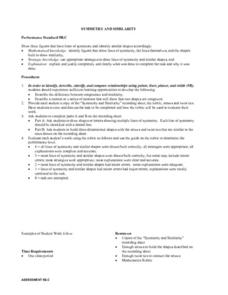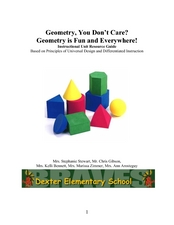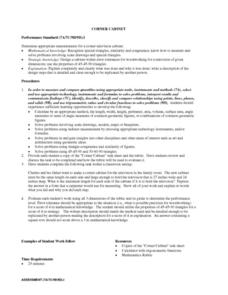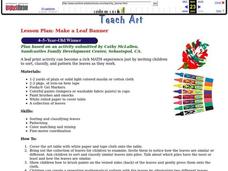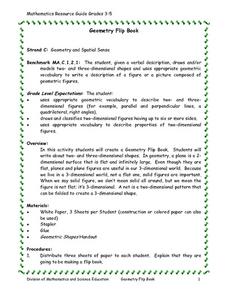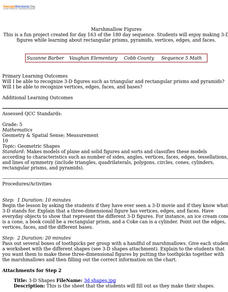Curated OER
Let's Talk Trash
Students identify class and types of materials in our environment. In this investigative lesson students work in groups to process information about what actions should be taken concerning solid waste.
Curated OER
Math: Symmetry and Similarity
Students describe the differences between congruence and similarity. After explaining the motions that indicate congruency of two shapes, they complete worksheets to draw lines of symmetry and similar shapes. With straws and twist...
Curated OER
Let's Talk Trash
In this solid waste worksheet, students classify the different types of solid wastes found in landfills into given categories. Students predict and tally the total number of each type of item found in the landfill using slips of paper....
Pennsylvania Department of Education
A Geometric Scavenger Hunt
Fifth graders connect their knowledge of polygons and polyhedrons. For this geometric shapes lesson, 5th graders identify and classify two- and three-dimensional objects. Students construct a polyhedron out of polygons and describe their...
Curated OER
The Quirky Quadrilateral
Fourth graders identify and classify different triangles and quadrilaterals. Then they demonstrate an understanding of plane and solid geometric objects and use this knowledge to show relationships and solve specific problems. Students...
Curated OER
3-D Attributes
Students explore geometric solids. In this geometry instructional activity, students listen to the book The Greedy Triangle by Marilyn Burns, then work in groups to sort geometric solids into various categories. Students define geometric...
Curated OER
Geometry is Fun and EverywhereGeometry, You Don’t Care? Geometry is Fun and Everywhere
Third graders investigate shapes in our world. In this geometry lesson plan, 3rd graders describe plane and solid shapes and identify angles, solid objects and lines of symmetry. Students use online resources, graphic organizers and...
Curated OER
Classifying Pyramids
Students study pyramids. In this prisms lesson, students explore the attributes of pyramids. Students will explore the lateral surface area of pyramids and be able to distinguish pyramids from other space shapes.
Curated OER
Classifying Transformations
Students analyze different polygons by shapes and sides. In this geometry lesson plan, students differentiate between similar and congruent polygons. They name the different polygons based on the number of sides.
Curated OER
Describe and Classify 2-D Shapes
In this 2-D shapes worksheet, students match a set of descriptions to shapes given. A reference website for additional resources is given.
Curated OER
Sort it Out
Students identify and sort a variety of two- and three-dimensional objects and compare and contrast their attributes. They identify shapes, locate shapes on the faces of solids, sort real objects and explain the sorting rule, and...
Curated OER
CORNER CABINET
Ninth and tenth graders calculate the length, width, height, perimeter, area, volume, surface area, angle measures or sums of angle measures of common geometric figures. They solve problems involving scale drawings, models, maps or...
Prince William Network
Migration Headache
During this game, kids become migratory shorebirds and fly among wintering, nesting, and stopover habitats. If they do not arrive at a suitable habitat on time, they do not survive. Catastrophic events are periodically introduced that...
Curated OER
A World Of Matter
First graders complete a variety of experiments with solids, liquids and gases. They read books about matter, identify the characteristics of solids, liquids and gases and the sort and classify a variety of matter. Students make...
Curated OER
Make a Leaf Banner
Students create an leaf print banner, and classify, sort and find patterns in the leaves as they work.
Curated OER
Math: Shapes and More Shapes
Students locate lines of symmetry in regular polygons and predict the number of lines of symmetry in an octagon. In three different polygons, they construct all lines of symmetry and after making their prediction about the octagon,...
Curated OER
More Prisms/Nets
Students calculate the volume and surface are of three-dimensional shapes. In this geometry lesson plan, students use the nets to prove their calculations of shapes. They identify the different parts of a solid using the nets.
Curated OER
Geometry Flip Book
Students investigate the concepts of geometry that can be grouped into a flip book that can be used for teaching and review purposes. They define the differences between two and three dimensional figures. Also polygons are reviewed and...
Pennsylvania Department of Education
The Weight of Things
Students explore weight. In this math instructional activity, students predict which item weighs more and discuss how they arrived at their decision. Students weigh several items to determine which weighs more.
Curated OER
Shape All Around
Students investigate solid shapes. In this geometry lesson, students take pictures of solid shapes and classify their pictures according to the vocabulary terms: edge, face and vertex. Students present their findings to the class.
Curated OER
Oobleck
Students incorporate within this lesson scientific observations, senses: touch, sound, smell and sight, classification, states of matter and surface tension. Students make a substance and use scientific observations, as well as their...
Shodor Education Foundation
Sets and the Venn Diagram (Beginner)
Venn diagrams are helpful in understanding the idea of a set and using attributes to sort items. This basic plan is an introduction with an added bonus of an applet that can be used to demonstrate the activity. If a classroom of...
Curated OER
Marshmallow Figures
Students enjoy making 3-D figures while learning about rectangular prisms, pyramids, vertices, edges, and faces. After a lecture/demo, students use marshmallows, toothpicks and a worksheet imbedded in this lesson to create 3 dimensional...
Curated OER
Supplementary, Complementary, and Vertical Angles
By using circles that they cut out and label themselves, learners literally "get a grip" on the angles they identify: supplementary, complementary, and vertical. They solve missing measurements based on properties of supplementary,...



